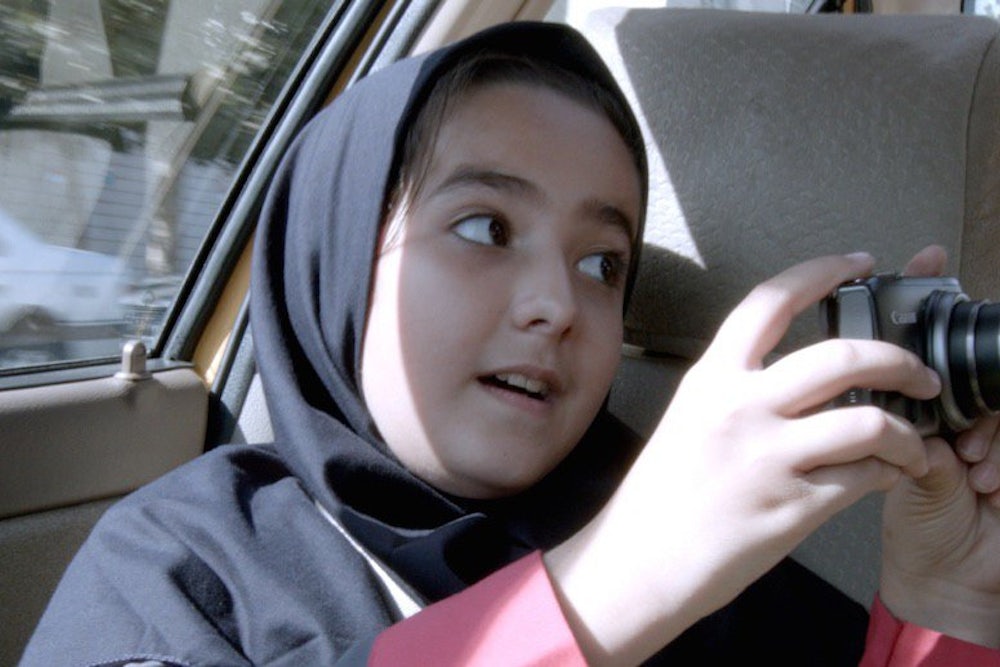Midway through Taxi, the driver of the titular vehicle, our protagonist of sorts, pulls up to a middle school to pick up his precocious, bright-eyed niece. She complains, in that manner kids have where you can practically see them forgetting their words even before they've spoken, that he's late, that she's the last student to head home, and that it's embarrassing to get picked up in a taxi anyway. The two gently rib each other back and forth. Eventually she pulls out her cell phone and starts to record him, almost absent-mindedly, for a school video project.
This quiet, inconsequential scene, one of many such conversations in Taxi, could have been dropped in from a Richard Linklater film, an exchange in Boyhood or an alternate version of the cab ride that opened his meandering debut Slacker. But this isn't Texas, and that isn't Linklater in the taxi. These are the streets of Tehran, and that man in the front seat is Jafar Panahi, a filmmaker whom the Iranian government has banned from making movies. And yet here he is, with another movie, a work of political art that asserts that the very act of recording, of turning on a camera, is an act of subversion.
Panahi has been a prominent figure in Iranian cinema for decades. His debut feature, The White Balloon, won a top prize at the 1995 Cannes Film Festival, and all of his films since have been festival-circuit hits. But the director's loose, humanist approach and concern with social injustice—women's rights in particular—frequently led him afoul of the Iranian government: The Circle (2000), Crimson Gold (2003) and Offside (2006) were all banned from exhibition within Iran. In 2010 he was arrested and convicted for "colluding in gathering and making propaganda against the regime”—part of a wider crackdown by Iranian authorities on political opposition. Around the same time, two major political parties were suspended, reformist newspapers were shut down, and the “House of Cinema,” Iran's largest professional guild for filmmakers, was declared illegal. Panahi was sentenced to six years in prison and banned from film production for 20 years.
The director, however, refused to be silenced, and despite being under extended house arrest, he created (with the help of fellow director Mojtaba Mirtahmasb) This Is Not a Film (2011), a striking documentary self-portrait in which Panahi wanders around his own apartment, reflecting on the creative and physical restrictions that have been imposed on him. In a twist straight out of Argo, the film was smuggled out of Iran to Cannes on a flash drive hidden inside a cake. The acclaim that met This Is Not a Film, as well as the international scrutiny it brought to Panahi's case, seems to have at least partially relaxed the pressure on the filmmaker: Taxi indicates that the director's travel ban has at least been lifted within Iran, and the film did not require prison-escape baking shenanigans to be submitted to the Berlin Film Festival, where it won the top prize in February.
Taxi remains of a piece with the director's previous work in its meandering, category-resistant structure. The film consists of a series of loose vignettes as Panahi drives around Tehran posing as a cab driver and picking up various fares. Some of the passengers appear to be total strangers, mildly bemused by the camera on the dashboard and their driver's obvious inexperience; others are familiar with Panahi and seem quite aware of what the filmmaker is up to. The action remains almost entirely in the conversations Panahi strikes up in these encounters, and his passengers are a consistently engaging, philosophical bunch. A schoolteacher and a mugger grapple with the ethics of petty crime, while Panahi's lawyer describes the dispiriting case of several young women who are jailed for attempting to watch a men's volleyball game. The director doesn’t have to do much to hold the audience's attention; the natural intimacy and improvisation of the dialogue draw us in. The streets outside Panahi's taxi may be unfamiliar to Americans, but inside the car we learn something of the people and their everyday lives, as spontaneously and unpretentiously as if we were sitting and chatting with them in person.
And even when he crafts more deliberate scenarios, Panahi's emphasis on the everyday manifestations of repression is riveting. At one point, filming out the window, Panahi's niece records an impoverished young boy rooting through trash bins. A passing couple accidentally drops a wad of cash, which the boy picks up, clearly about to keep for himself; but before he can run off, Panahi's niece urges him to return the dropped bills. Her objection isn't moral, exactly, or at least the morals aren't hers. If the boy doesn't return the money, her teacher and the authorities will deem the film she's making “unscreenable,” and her work will never be seen—a sentence her famous uncle would find all too familiar.
An American director like Linklater could film a poor young man picking money up off the street without worrying about that footage being banned from theaters. That might not make the video any less political—we just have a tendency not to notice the political power of art unless it's being repressed. Panahi's work reasserts the radical essence of creative expression in all its forms, from the slickest Hollywood production to the lowliest cell phone recording. The subjects in Taxi are constantly recording, watching and talking about video—besides Panahi's niece, a wounded cyclist insists on filming his will and testimony, and an old school friend of Panahi's shows the director security footage of a robbery on his iPad. These constant variations on a theme insist that such recording is a fundamental human act, an urge that cannot be suppressed no matter what authoritarian power bans it. Whether in Tehran or Texas, the cameras will keep rolling.
